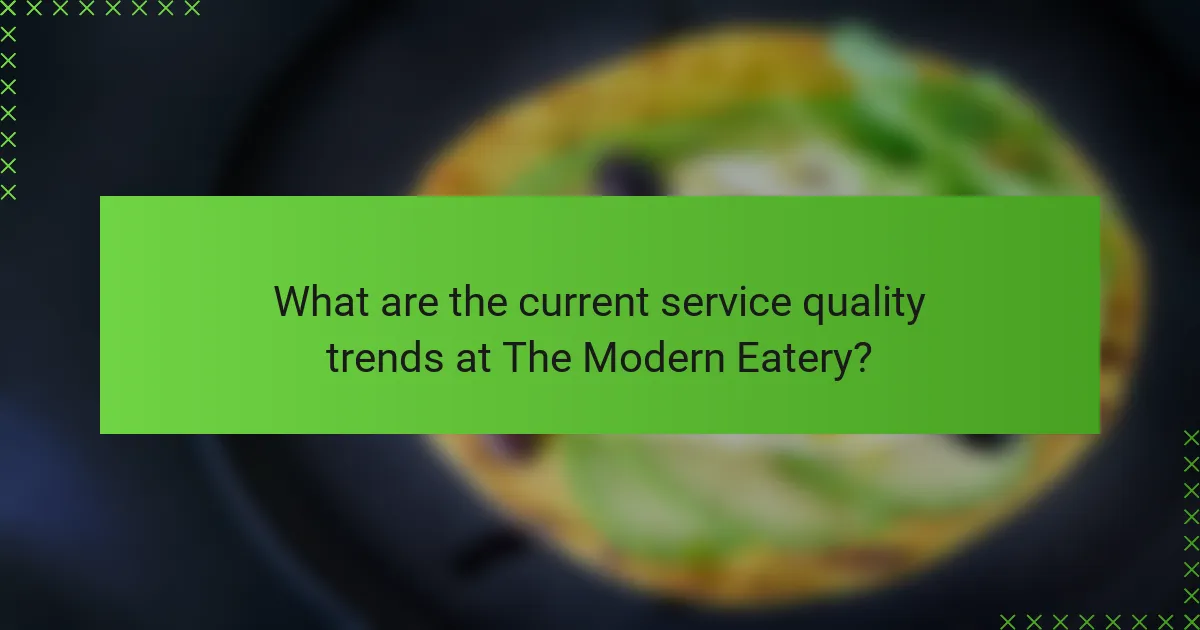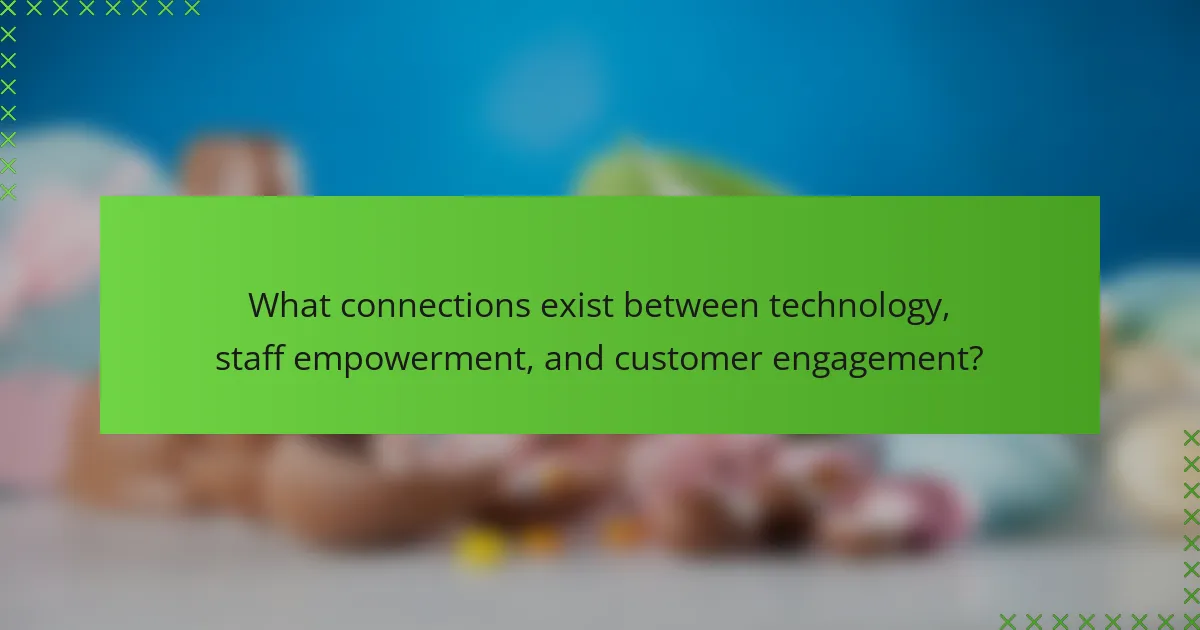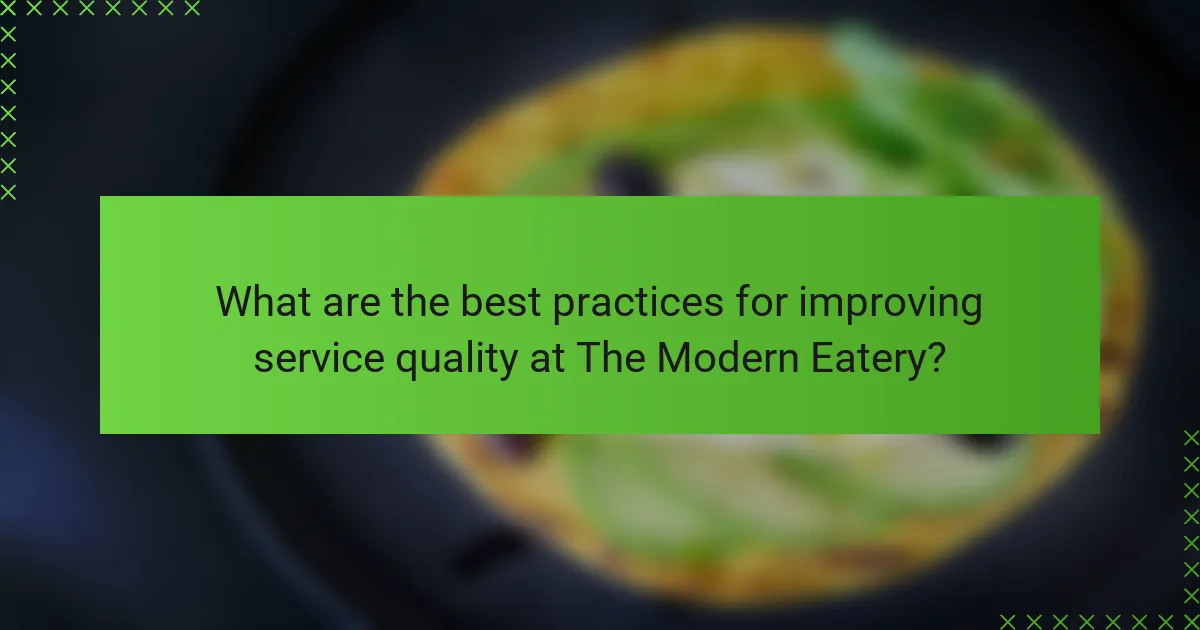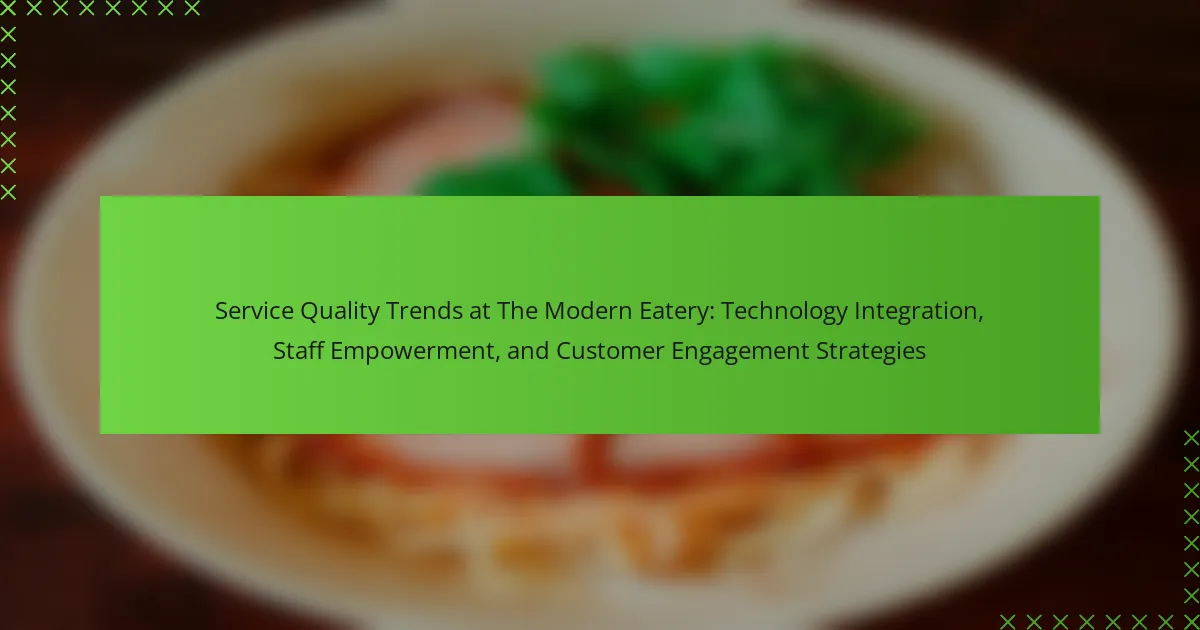
What are the current service quality trends at The Modern Eatery?
Current service quality trends at The Modern Eatery include enhanced technology integration and staff empowerment. The eatery utilizes digital ordering systems to streamline customer interactions. This reduces wait times and improves order accuracy. Staff members are trained to engage effectively with customers, fostering a welcoming atmosphere. The Modern Eatery also implements feedback mechanisms to adapt services based on customer preferences. These trends contribute to an overall improved dining experience.
How is technology integration shaping service quality at The Modern Eatery?
Technology integration is enhancing service quality at The Modern Eatery. It streamlines operations through efficient ordering systems and payment processes. This reduces wait times for customers, improving their overall dining experience. Advanced data analytics allows staff to personalize service based on customer preferences. Integration of mobile apps facilitates easy reservations and menu browsing. Digital feedback mechanisms enable quick responses to customer concerns. These innovations collectively foster a more engaging and satisfying atmosphere for diners. Ultimately, technology integration leads to higher customer satisfaction and loyalty at The Modern Eatery.
What specific technologies are being implemented to enhance service quality?
Artificial intelligence, chatbots, and mobile applications are specific technologies enhancing service quality. AI analyzes customer data to personalize experiences. Chatbots provide instant responses to customer inquiries, improving engagement. Mobile applications streamline ordering and payment processes, reducing wait times. These technologies collectively increase efficiency and customer satisfaction. According to a report by McKinsey, businesses using AI in customer service can improve response times by up to 30%.
How does technology improve operational efficiency and customer experience?
Technology enhances operational efficiency by automating processes and streamlining workflows. Automation reduces manual tasks, allowing staff to focus on customer interactions. For instance, point-of-sale systems quickly process transactions, minimizing wait times. Additionally, inventory management software tracks stock levels in real-time, preventing shortages and overstocking.
Customer experience improves through personalized services enabled by technology. Data analytics helps understand customer preferences and behaviors. This information allows for tailored marketing and menu offerings. Mobile apps facilitate easy ordering and payment, enhancing convenience for customers.
Research by McKinsey & Company indicates that technology adoption can lead to a 20-30% increase in operational efficiency. Furthermore, a survey by Deloitte found that 80% of customers prefer businesses that offer digital engagement options. These statistics underscore the significant impact of technology on operational efficiency and customer experience.
What role does staff empowerment play in service quality at The Modern Eatery?
Staff empowerment significantly enhances service quality at The Modern Eatery. Empowered staff are more engaged and motivated in their roles. This leads to improved customer interactions and satisfaction. When employees feel valued, they are more likely to take initiative in problem-solving. This proactive approach results in quicker service responses. Additionally, empowered staff can adapt to customer needs more effectively. Studies show that organizations prioritizing employee empowerment see higher customer loyalty. Therefore, staff empowerment directly correlates with elevated service quality at The Modern Eatery.
How are staff trained and motivated to provide high-quality service?
Staff are trained and motivated to provide high-quality service through comprehensive training programs and incentive systems. Training programs include workshops and hands-on sessions focusing on customer service skills and product knowledge. Staff receive regular feedback and coaching to enhance their performance. Incentive systems, such as bonuses and recognition programs, encourage staff to excel in service delivery. Research shows that companies with effective training and motivation strategies experience higher customer satisfaction rates. For example, a study by the American Society for Training and Development found that organizations investing in employee training see a 24% higher profit margin.
What impact does staff empowerment have on customer satisfaction?
Staff empowerment significantly enhances customer satisfaction. Empowered staff are more engaged and motivated. They can make decisions that improve service quality. This leads to quicker problem resolution and a better customer experience. Research shows that companies with empowered employees see higher customer loyalty. For example, a study by Gallup found that engaged employees can increase customer ratings by 10%. This connection between empowerment and satisfaction is crucial for service-oriented businesses.
How are customer engagement strategies evolving at The Modern Eatery?
Customer engagement strategies at The Modern Eatery are evolving through enhanced technology integration and personalized experiences. The establishment is utilizing data analytics to understand customer preferences better. This allows for tailored promotions and menu offerings. Additionally, The Modern Eatery is implementing mobile ordering systems. These systems streamline the ordering process and improve customer convenience. Social media engagement is also a focus, fostering community interaction and feedback. By actively responding to customer inquiries online, The Modern Eatery builds stronger relationships. These strategies collectively enhance the overall dining experience, driving customer loyalty and satisfaction.
What methods are used to engage customers effectively?
Effective customer engagement methods include personalized communication, loyalty programs, and interactive experiences. Personalized communication involves tailoring messages and offers to individual customer preferences. This approach increases relevance and fosters stronger connections. Loyalty programs incentivize repeat business by rewarding customers for their continued patronage. These programs can significantly boost customer retention rates. Interactive experiences, such as social media engagement and live events, create opportunities for customers to connect with the brand and each other. Research indicates that businesses utilizing these methods see a marked improvement in customer satisfaction and loyalty.
How does customer feedback influence service quality improvements?
Customer feedback directly influences service quality improvements by providing insights into customer preferences and expectations. It helps businesses identify areas that require enhancement. For instance, feedback can reveal specific service shortcomings or highlight successful practices. This information allows companies to make data-driven decisions. Implementing changes based on feedback can lead to increased customer satisfaction. A study by the Harvard Business Review found that companies leveraging customer feedback saw a 10-15% increase in customer retention. Thus, customer feedback is essential for continuous service quality enhancement.

What connections exist between technology, staff empowerment, and customer engagement?
Technology, staff empowerment, and customer engagement are interconnected elements that enhance service quality. Technology facilitates communication and operational efficiency, allowing staff to perform better. Empowered staff can make decisions that improve customer experiences. Engaged employees are more likely to provide exceptional service, leading to higher customer satisfaction. Research indicates that companies with high employee engagement see a 20% increase in customer satisfaction scores. This relationship demonstrates that investing in technology and staff empowerment directly influences customer engagement.
How do these elements work together to enhance overall service quality?
Technology integration, staff empowerment, and customer engagement strategies collectively enhance overall service quality. Technology integration streamlines operations, allowing for faster service delivery. This reduces wait times and improves customer satisfaction. Staff empowerment fosters a motivated workforce, enabling employees to make decisions that enhance the customer experience. Engaged staff are more likely to provide personalized service, which builds customer loyalty. Customer engagement strategies, such as feedback systems, ensure that businesses adapt to customer needs. This responsiveness leads to continuous improvement in service quality. Together, these elements create a cohesive approach that elevates the dining experience at The Modern Eatery.
What challenges arise when integrating technology, empowering staff, and engaging customers?
Integrating technology, empowering staff, and engaging customers presents several challenges. One challenge is resistance to change among staff. Employees may be hesitant to adopt new technologies or processes. This can hinder effective implementation. Another challenge is the need for adequate training. Staff must understand how to use new tools effectively. Without proper training, technology may not be utilized to its full potential.
Additionally, aligning technology with customer expectations can be difficult. Customers may have varying preferences for engagement methods. This requires a flexible approach to technology integration. Data privacy and security concerns also arise when using technology. Protecting customer information is crucial for maintaining trust.
Finally, measuring the impact of these strategies can be complex. Businesses need to track multiple metrics to assess success. This adds another layer of difficulty in evaluating effectiveness.

What are the best practices for improving service quality at The Modern Eatery?
Implementing staff training programs is essential for improving service quality at The Modern Eatery. Regular training enhances employee skills and knowledge. This leads to better customer interactions. Utilizing technology for order management increases efficiency. It reduces wait times and improves accuracy. Gathering customer feedback is crucial for continuous improvement. Feedback helps identify areas needing attention. Encouraging staff empowerment fosters a positive work environment. Empowered employees are more engaged and motivated to provide excellent service. Lastly, creating a welcoming atmosphere enhances the overall dining experience. A pleasant environment encourages repeat visits and positive reviews.
How can The Modern Eatery leverage technology for better service delivery?
The Modern Eatery can leverage technology for better service delivery by implementing online ordering systems. These systems streamline the ordering process, reducing wait times for customers. Additionally, mobile apps can facilitate reservations and enable customers to customize their orders easily.
Tablets at tables can enhance the dining experience by allowing customers to place orders and request service without waiting for staff. Integrating a customer relationship management (CRM) system can help track customer preferences and feedback. This data can be used to personalize service and marketing efforts.
Furthermore, employing analytics tools can help The Modern Eatery optimize inventory management and reduce food waste. Automated payment solutions can speed up the checkout process, improving overall efficiency. By embracing these technologies, The Modern Eatery can enhance customer satisfaction and operational efficiency.
What are the key technologies to consider for future integration?
Key technologies to consider for future integration include artificial intelligence, cloud computing, and Internet of Things (IoT). Artificial intelligence enhances customer personalization and operational efficiency. Cloud computing allows for scalable data storage and access. IoT devices improve real-time inventory management and customer interactions. These technologies can streamline processes and enhance service quality. For instance, AI can analyze customer data to predict preferences, increasing satisfaction. Cloud solutions enable seamless collaboration among staff, improving service delivery. IoT applications can monitor equipment and automate tasks, reducing downtime. Implementing these technologies supports a modern eatery’s growth and adaptability in a competitive market.
What strategies can be implemented to further empower staff?
Implementing strategies to empower staff includes providing training and development opportunities. Regular workshops enhance skills and knowledge. Encouraging open communication fosters a collaborative environment. Feedback mechanisms allow staff to voice opinions and suggestions. Recognizing and rewarding achievements boosts morale and motivation. Offering flexible work arrangements accommodates individual needs. Involving staff in decision-making processes increases their investment in outcomes. Research shows that empowered employees are more productive and engaged, leading to improved service quality.
How can staff feedback be utilized to refine service approaches?
Staff feedback can be utilized to refine service approaches by identifying areas for improvement. Feedback provides insights into staff experiences and customer interactions. This information helps pinpoint specific service gaps. Regularly collecting feedback allows for timely adjustments in training and procedures. Analyzing feedback trends can reveal common issues faced by staff. Implementing changes based on staff input fosters a more engaged workforce. Engaged staff are more likely to enhance customer satisfaction. A study by the Harvard Business Review found that companies with strong employee engagement see a 20% increase in productivity.
What are effective ways to enhance customer engagement continuously?
Effective ways to enhance customer engagement continuously include leveraging technology, personalizing experiences, and fostering community interaction. Technology integration can streamline communication and provide real-time feedback. Personalization, such as tailored recommendations, increases customer satisfaction and loyalty. Community interaction through events or social media builds a sense of belonging. Research shows that businesses using personalized marketing see a 20% increase in sales. Engaging customers through loyalty programs also encourages repeat visits. Regularly updating content and offerings keeps the experience fresh and relevant.
How can The Modern Eatery measure the success of its engagement strategies?
The Modern Eatery can measure the success of its engagement strategies through customer feedback and analytics. Collecting customer reviews and ratings provides direct insights into customer satisfaction. Monitoring social media engagement metrics, such as likes, shares, and comments, indicates audience interaction. Analyzing website traffic and online reservation data reveals the effectiveness of digital engagement efforts. Conducting surveys can gather specific feedback on customer experiences. Tracking repeat customer visits and loyalty program participation demonstrates customer retention. Utilizing tools like Net Promoter Score (NPS) can quantify customer loyalty and likelihood to recommend. Implementing these methods allows The Modern Eatery to assess and refine its engagement strategies effectively.
The Modern Eatery is the primary entity discussed in this article, focusing on current service quality trends that emphasize technology integration, staff empowerment, and customer engagement strategies. Key topics include how digital ordering systems and AI enhance operational efficiency and customer satisfaction, the role of empowered staff in improving service quality, and the importance of personalized customer engagement methods. Additionally, the article highlights best practices for leveraging technology and feedback mechanisms to continuously refine service delivery and enhance the overall dining experience.
